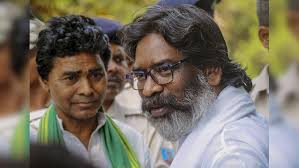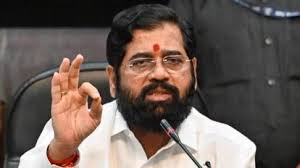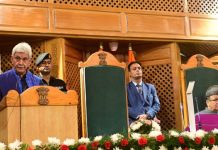The BJP-led Mahayuti alliance scored a historic win in Maharashtra, leveraging cash schemes and communal rhetoric while Congress struggled to connect with local issues. In contrast, Jharkhand reaffirmed its loyalty to the JMM, rejecting the BJP’s aggressive campaign, writes Mudit Mathur

Amid brewing controversies over Kashi and Mathura, a high-pitched campaigning aimed at igniting passions for a Hindu renaissance ensured a historic and unprecedented victory for the BJP-led Mahayuti alliance. The BJP achieved an impressive 89 percent success rate in the seats it contested. However, in Jharkhand, the BJP failed to make inroads among tribal communities despite flagship schemes launched by Prime Minister Modi. The state remains a loyal stronghold of the Jharkhand Mukti Morcha (JMM), which has pledged to protect tribal lands, water bodies, and forests from exploitation by corporates. Despite emerging as the largest opposition party in the Lok Sabha elections, the Congress failed to capitalise on its gains and ended up significantly diminished.

Maharashtra’s fiercely contested Assembly election centred on cash, caste, communalism, and crops. The BJP, with Mahayuti allies—Eknath Shinde’s Shiv Sena and Ajit Pawar’s NCP—leveraged cash, caste dynamics, and communal sentiments to offset agrarian distress caused by falling crop prices. Notably, the swift disbursement of welfare scheme benefits overshadowed the Maha Vikas Aghadi’s (MVA) campaign, which focused on pressing national issues. The MVA appeared to rely on the same narrative used during the Lok Sabha elections.
MVA focused its campaign highlighting deteriorating crop prices in Maharashtra’s rural areas with the state’s main crops, soyabean and cotton, selling far below the MSP, unbearable price rise of essential commodities gone up by the double-digit food inflation at 10.9 per cent that going up to 42.2 per cent for vegetables, record unemployment taking a visible toll across the state’s urban and rural belts and concentration of wealth in the hands of a favoured few corporates––Adanis and Ambanis.
Buoyed by its victory in Haryana, the BJP employed smart social engineering in Maharashtra, organising OBC communities to counter Maratha anger while leveraging communal rhetoric. Fiery slogans like “Batenge To Katenge” by Uttar Pradesh Chief Minister Yogi Adityanath polarised Hindu votes and consolidated a decisive swing in favour of the BJP.
The unmatched strategy of the Mahayuti alliance spearheaded at the helm by PM Narendra Modi and his Home Minister Amit Shah in Maharashtra has swept a state that is not a traditional bastion and it has also raced ahead of its allies securing the highest numbers of seats. The BJP-led Mahayuti alliance further negates the narrative set by the INDIA alliance concerning the danger to the Constitution and the threat to the abolition of reservations of SC-ST by winning back their support securing about 20 of the state’s 29 SC-reserved seats. At the same time, Congress has broadly squandered away the considerable advantage it had gained in June and failed to resonate well with the local realities due to a lack of organisational feedback mechanism.
In contrast, the Congress squandered the momentum it gained in June, failing to connect with local realities due to a lack of an effective organisational feedback mechanism. While the Congress continued to focus on issues like constitutional threats and caste census, the BJP and its allies learned from their Lok Sabha debacle and restructured their strategy. By sidelining contentious national issues and prioritising local concerns, they ensured the effective rollout of large-scale cash transfer schemes, with active participation from RSS volunteers.
A notable example was the hurriedly launched Ladki Bahin Yojana, which empowered women through direct cash payments of Rs 1,500. This scheme turned out to be a game-changer, with Rs 7,500 disbursed to women just before the elections. Similar welfare measures had earlier helped the BJP overcome anti-incumbency in Madhya Pradesh.
However, Maharashtra’s new government faces a formidable challenge in financing the Ladki Bahin Yojana. With plans to increase the monthly payout from Rs 1,500 to Rs 2,100, the scheme will require an annual expenditure of Rs 63,000 crore to cover the intended 2.5 crore women beneficiaries, straining the state’s already significant debt burden.
In the Assembly, the BJP emerged as the big winner, led by Devendra Fadnavis, who secured 132 seats in the 288-member house. Meanwhile, its breakaway allies—Eknath Shinde’s Shiv Sena faction and Ajit Pawar’s NCP—claimed the legacy of their respective parties. The mandate, however, reflected a diminishing sympathy factor for their founders, just six months after their split.
Jharkhand
Hemant Soren made a stunning comeback in Jharkhand, where his JMM-led alliance stormed to power for a second consecutive term, securing 56 seats in the 81-member assembly. Despite the anticipation of better showing, the BJP-led NDA managed only 24 seats. However, the INDIA alliance’s victory in Jharkhand could not be celebrated nationally due to unexpected electoral setbacks in Maharashtra.
The electoral strategies that brought success to the BJP in Haryana and Maharashtra failed in Jharkhand, despite the full-time involvement of top BJP leaders Shivraj Singh Chouhan and Himanta Biswa Sarma, who were in charge of the campaign. Interestingly, as Jharkhand does not share an international border, the issue of illegal immigration—central to BJP’s campaigns in other states—was irrelevant here.
Prime Minister Narendra Modi addressed six rallies in Jharkhand but failed to sway tribal voters from their trust in Hemant Soren. Soren, who was arrested on 31 January 2024 by the ED in connection with an alleged land scam, had stepped down and appointed Champai Soren to lead the state in his absence. Upon his release, Hemant Soren resumed his role as Chief Minister, leaving Champai Soren disheartened. Champai later joined the BJP, but the party struggled to find a leader capable of challenging Hemant Soren’s influence.
Kalpna Soren emerged as a prominent leader in Hemant Soren’s absence, representing the party on the national stage with INDIA alliance leaders and successfully campaigning during the Lok Sabha elections.
The BJP centred its high-profile campaign around the issue of “illegal immigrants,” but this backfired, even with UP Chief Minister Yogi Adityanath’s incendiary slogan, “Batenge tpTo Katenge.” BJP insiders attributed their defeat in Jharkhand to the state’s demographic composition, with tribals and Muslims accounting for 26% and 14% of the population, respectively.
Priyanka’s resounding win
The Congress made gains in the recently held by-polls. Congress General Secretary Priyanka Gandhi secured a resounding victory in Kerala’s Wayanad constituency, securing over 6.22 lakh votes in her maiden electoral contest. She defeated her closest rival, Sathyan Mokeri of the Communist Party of India, by a margin of 4.1 lakh votes. Despite a decline in voter turnout, Priyanka Gandhi broke the record of 3.65 lakh votes set by her brother Rahul Gandhi in the 2024 elections.
In another significant win, the Congress also claimed the Nanded Lok Sabha seat in a closely contested by-poll. Congress candidate Ravindra Vasantrao Chavan narrowly defeated BJP nominee, Dr Santukrao Marotrao Hambarde, by just 1,457 votes.
SP suffers setback
The by-elections in Uttar Pradesh, Rajasthan, and Bihar yielded mixed results across 20 assembly seats.
In Uttar Pradesh, the BJP secured six assembly seats, while its ally, Rashtriya Lok Dal (RLD), won one. The Samajwadi Party faced a significant setback, winning only two of the nine assembly seats it contested.
In Rajasthan, the BJP triumphed in five of the seven assembly constituencies, while the Congress and the Bharat Adivasi Party won one seat each.
In Bihar, the ruling NDA alliance swept all four assembly seats, maintaining its dominance in the state.











